In the realm of avian companionship, cockatiel owners find joy in the vibrant personalities of their feathered friends. However, the responsible care of these birds extends beyond daily interactions to encompass their overall health. One pressing concern that cockatiel owners should be aware of is the issue of overweight cockatiels. This article aims to address the signs, impacts, and tips for overweight cockatiels.

Contents
Signs of an Overweight Cockatiel
Recognizing the signs of obesity in cockatiels is a crucial aspect of responsible bird ownership. Being attuned to both physical and behavioral indicators enables cockatiel owners to provide proactive care and address potential health issues in a timely manner.
Changes in plumage
Cockatiel owners should pay close attention to their cockatiel’s feathers. Obesity can lead to changes in plumage quality and appearance. Feathers may become dull, unkempt, or exhibit signs of wear. Additionally, the bird may have difficulty preening itself due to limited mobility.
Difficulty in movement
One of the most noticeable physical indicators of obesity in cockatiels is difficulty in movement. An overweight bird may struggle to perch or move around its cage with the same agility as before. Owners may observe hesitation in climbing or an increased reliance on perches for rest.
Rounded appearance
A rounded or bulging appearance, especially in the abdominal region, is a visual cue that a cockatiel may be carrying excess weight. This can be observed from various angles, and the bird may lose its sleek, streamlined profile. Regularly comparing the bird’s current appearance to past photographs can help in identifying changes.
Decreased activity
Behavioral changes are equally important indicators of obesity. A once active and playful cockatiel may exhibit a significant reduction in overall activity levels. This could include a reluctance to engage in typical play behaviors, decreased interest in toys, and a general lethargy.
Lethargy
Obesity can contribute to a general sense of lethargy in cockatiels. Birds may spend more time resting, sleeping, or perched in one location for extended periods. A noticeable decrease in vocalizations and interaction with the surroundings can also accompany this lethargic state.
Recognizing the signs of an overweight cockatiel requires a keen eye and a proactive approach. By observing both physical and behavioral changes, cockatiel owners can play an active role in maintaining their feathered friends’ health. Regular monitoring and veterinary guidance will ensure potential issues are addressed, and allow cockatiels a healthy, active, and fulfilling lives.
Impact of Overweight on Cockatiel Health
The consequences of obesity in cockatiels extend beyond mere physical appearance, posing significant risks to their overall health and well-being. Cockatiel owners must be aware of these potential complications to take proactive measures to safeguard the longevity and vitality of their avian companions.
Cardiovascular issues
Excess weight in cockatiels places additional strain on the cardiovascular system. The heart has to work harder to pump blood throughout the body, leading to increased stress on the organ. Over time, this heightened workload can contribute to cardiovascular issues such as heart disease and hypertension, adversely affecting the bird’s circulatory health.
Joint problems
The skeletal system of a cockatiel is not designed to bear excessive weight. Obesity puts strain on joints, leading to conditions such as arthritis. Joint problems can result in discomfort, decreased mobility, and a reluctance to engage in physical activities. These issues not only impact the bird’s ability to move but also contribute to a diminished quality of life.
Compromised immune system
An overweight cockatiel is more susceptible to a compromised immune system. Obesity has been linked to a weakened immune response, making birds more prone to infections and illnesses. A weakened immune system not only hampers the bird’s ability to fight off diseases but can also prolong recovery times when sickness occurs.

Impact on quality of life
The long-term consequences of obesity significantly impact a cockatiel’s overall quality of life. Birds that are overweight may experience a decline in energy levels, limiting their ability to engage in natural behaviors such as flying and playing. A diminished quality of life can lead to behavioral changes, affecting the bird’s interaction with its environment and diminishing the joy it brings to its owner.
Take Care Tips for Cockatiel Owners
To ensure the health of your cockatiel, owners need to pay attention to their diet as well as consider exercising their parrots to improve their health and control weight. If you have serious problems or unusual symptoms, you should bring them to your doctor for examination.
Dietary considerations for cockatiel owners
In addressing overweight cockatiels, cockatiel owners must be mindful of the dietary needs of their feathered friends. An ideal diet comprises a balance of high-quality pellets, fresh fruits, and vegetables. Portion control is crucial to prevent overeating, and a diverse diet provides essential nutrients.
An ideal diet involves a mix of high-quality pellets, fresh vegetables like leafy greens and carrots, safe fruits such as apples and berries, and occasional seeds or nuts for variety. Adequate water, calcium-rich sources, and processed food also contribute to a balanced diet, ensuring your cockatiel’s overall well-being and longevity.
Encouraging Exercise for cockatiels
Exercise plays a pivotal role in combating obesity in cockatiels. Cockatiel owners can engage their feathered companions in physical activities through creative means. From introducing new toys to setting up bird-safe play areas, the possibilities are endless.
Exercise is paramount for cockatiel health, preventing obesity, and promoting mental stimulation. Owners can encourage active play with toys, set up perches at various heights, and allow supervised flight time. Rotate toys regularly to keep the environment stimulating, ensuring a happy and healthy cockatiel companion.
Monitoring and assessing weight
Regular monitoring of a cockatiel’s weight is an integral part of preventive care. Routine weigh-ins at home provide a baseline for the bird’s weight, and any sudden deviations can be indicative of underlying issues. Cockatiel owners are encouraged to use a reliable bird scale and keep a record of weight fluctuations.
Veterinary guidance and regular check-ups
While proactive care at home is essential, consulting a veterinarian is paramount in managing and preventing obesity in cockatiels. Veterinarians play a crucial role in avian health, offering specialized care for birds like cockatiels. Regular check-ups are vital to detect and address potential health issues early, ensuring optimal well-being and longevity for these feathered companions.







